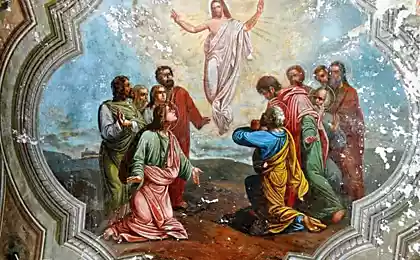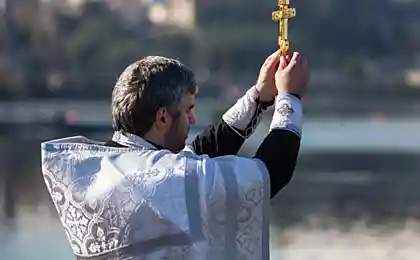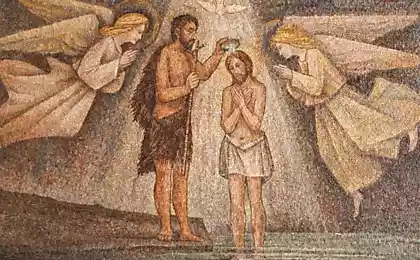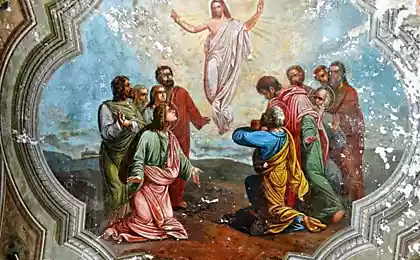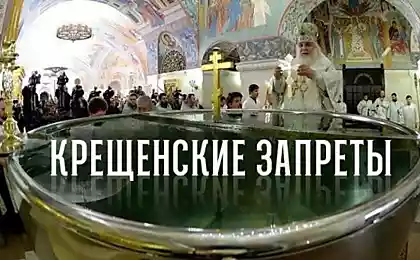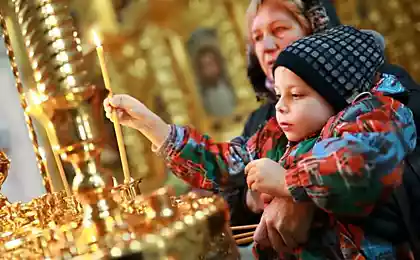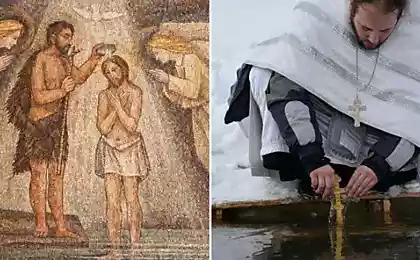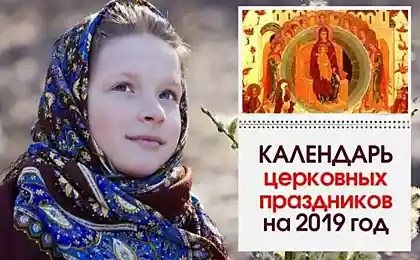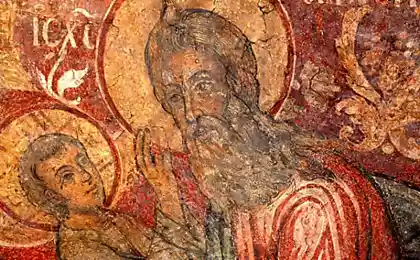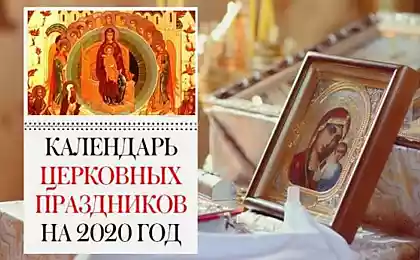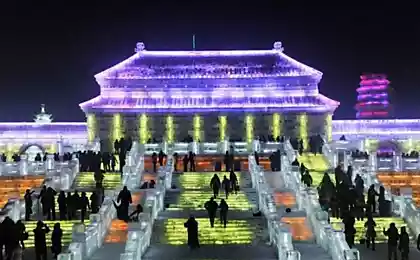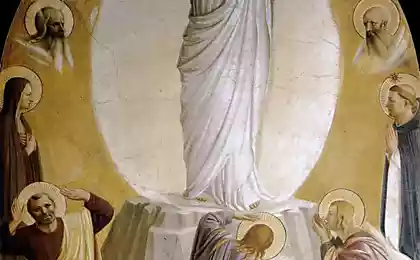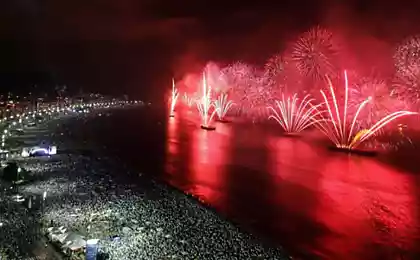535
19 January — Epiphany (Epiphany)
The essence of the feast ofEpiphany - one of the great feasts celebrated in honor of the baptism of Jesus Christ in the river Jordan by John the Baptist. The baptism of Christ is celebrated, not less solemn than Christmas. The holidays of Christmas and Epiphany connected with Christmas time and make a single celebration – the feast of the Epiphany. In unity these holidays are all three persons of the Holy Trinity:
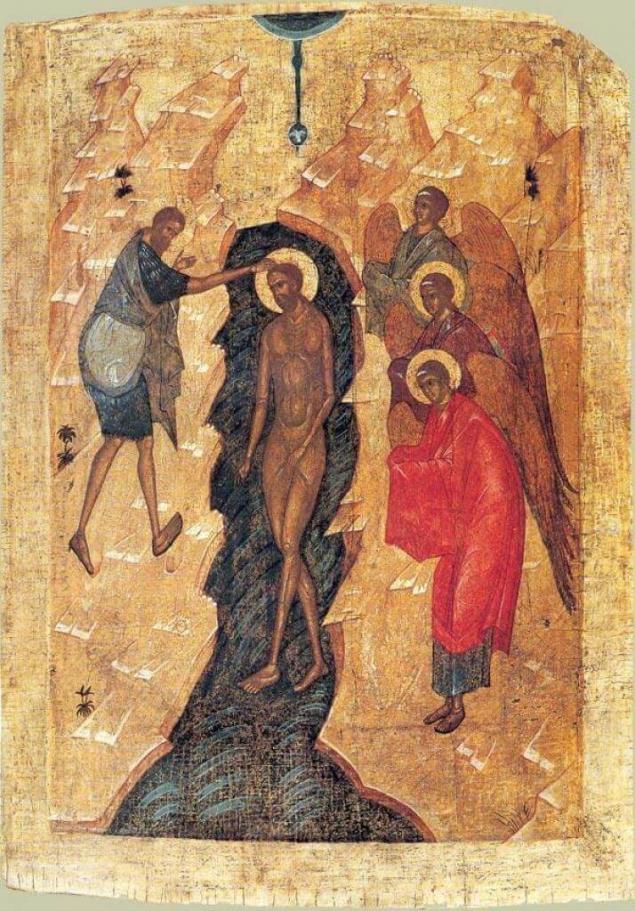
Worship Feast of the Baptism of the Lord is sent in the same way as the feast of the Nativity. Committed on the eve the Royal Hours, Liturgy of St. Basil the Great and Vespers, Great Compline beginning.
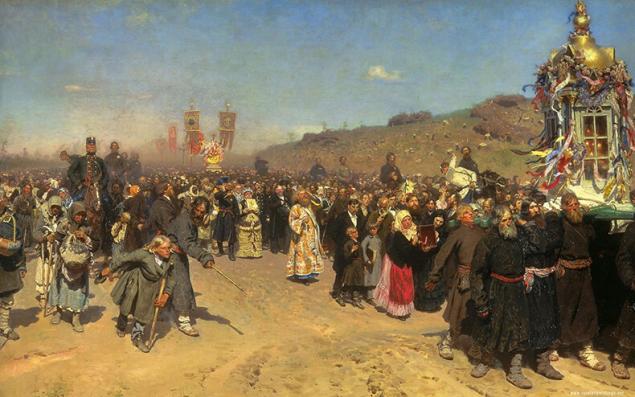
The peculiarity of this Festival are two great water blessing (lesser blessing of water can be accomplished at any other time). The first great blessing of water is on the eve of the Feast in the temple. The second in the Celebration under the open sky on the rivers, ponds, wells.
On the day of Baptism the rite of consecration of water is performed in the hole, made in the form of an Orthodox cross. First, in ancient times, were made for the baptism of catechumens and is, subsequently, was drawn to the remembrance of the baptism of the Lord. The second probably originated from the ancient usages of the Jerusalem Christians, the day of Epiphany, to go to the Jordan river to remember the baptism of the Savior. So the Epiphany procession is the name of the procession to the Jordan.
The biblical events of Jesus Christ, had returned after the death of king Herod from Egypt, grew up in the small town of Nazareth, located in Galilee. Blessed with His Mother He remained in this city until His thirtieth year, earning a livelihood Himself and the blessed virgin carpenter's trade.
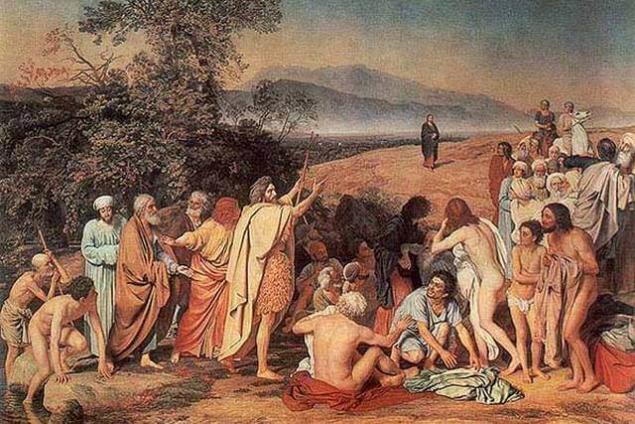
When executed the thirtieth year of His earthly life, i.e. the time by which according to the Jewish law nobody was allowed to teach in the synagogues, and take a curacy, the time has come for the appearing of His people Israel.
But before that moment, the prophetic word had to appear to Israel in fulfillment of prophecy, on which lay the task of preparing the people of Israel to accept the Messiah, he of whom the prophet Isaiah foretold: “a voice crying in the wilderness, prepare ye the way of the Lord, make straight in the desert a highway for our God”.
Away from people, in the depths of the harsh Judean desert was the word of God came unto John the son of Zechariah, the kinsman of the blessed virgin, which is still in the womb of his mother, the righteous Elizabeth, leaped joyfully welcoming their Saviour, which in the world yet no one knew, except His blessed Mother who received the gospel from the Archangel. The word of God commands John to go out into the world to preach repentance and to baptize Israel, to bear witness of the Light, that all might believe through him.
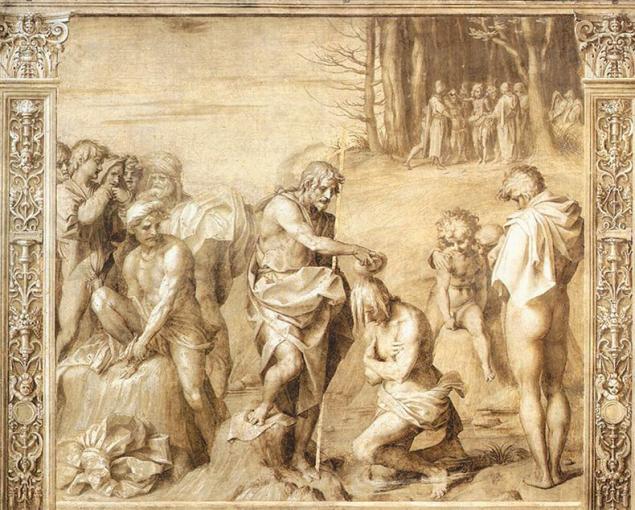
The Jews coming to John, there is a natural question: is Not this, chamy all the deliverer, the Consolation of Israel? The Baptist, in response said: "come after me one more powerful than I, Whose I am not worthy to stoop down and unloose His shoes; I baptized you with water but He will baptize you with the Holy Spirit".
According to the gospel story, John the Baptist was at the Jordan river in Bethany on the other side (Jn.1:28), came Jesus Christ with the goal to be baptized. John, a lot of preaching about the imminent coming of the Messiah, saw Jesus, he was surprised and said, "I have need to be baptized of Thee, and why COMEST Thou unto me?". To this Jesus replied, "it becometh us to fulfill all righteousness" and was baptized by John.
Jesus Christ had no need of this baptism as a sinless and blameless, one born of the blessed virgin Mary and He, His deity, the former is the source of all purity and Holiness. But as He took upon Himself the sins of the whole world, and came to the waters of the Jordan to purge them through baptism.
He came to be baptized in order to consecrate an aqueous nature, that we grant the font of Holy baptism. He came to be baptized also in order to John saw the fulfillment of the word of God, who commanded him to come out of the desert: “he On Whom you see the spirit descending and abiding on Him, he is The one that'll baptize with the Holy Spirit.”
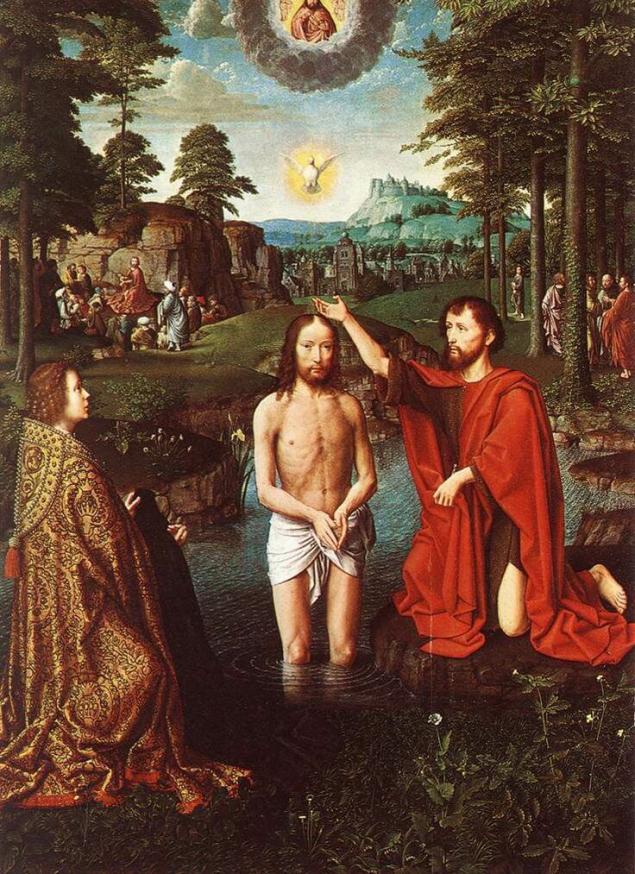
Holy the Baptist obeyed the word of Christ, and Jordan has taken in its waters, the command Which started the current. As narrates the gospel, after baptism the Lord immediately came out of the water. This "immediately" Church tradition tells us that Saint John the Baptist he baptized each person immersed to the neck, and so held him until, until he confessed all his sins. Only after this man was allowed to get out of the water. Christ, had no sin, could not hold water, and therefore immediately out of the river.
At baptism "the heaven was opened, and the Holy Spirit descended on Him in bodily form like a dove, and a voice came from heaven, saying, Thou art My Beloved Son; in Thee I am well pleased." (LK.3:21-22).
After his baptism Jesus Christ, guided by the Spirit, went into the desert, in solitude, prayer and fasting to prepare for the execution of the mission with which he came to Earth. Jesus Christ forty days "was tempted of the devil and ate nothing in those days, and after them he was hungry" (LK.4:2). Then came to him the devil's three temptations tried to seduce him to sin as any man.
The location of Holy Baptism
The place where he preached, and was baptized by John the Baptist, according to Church tradition, was called a True (countryside beyond the Jordan, where there was a crossing through the river, which explains the name of the town — house of the crossing.
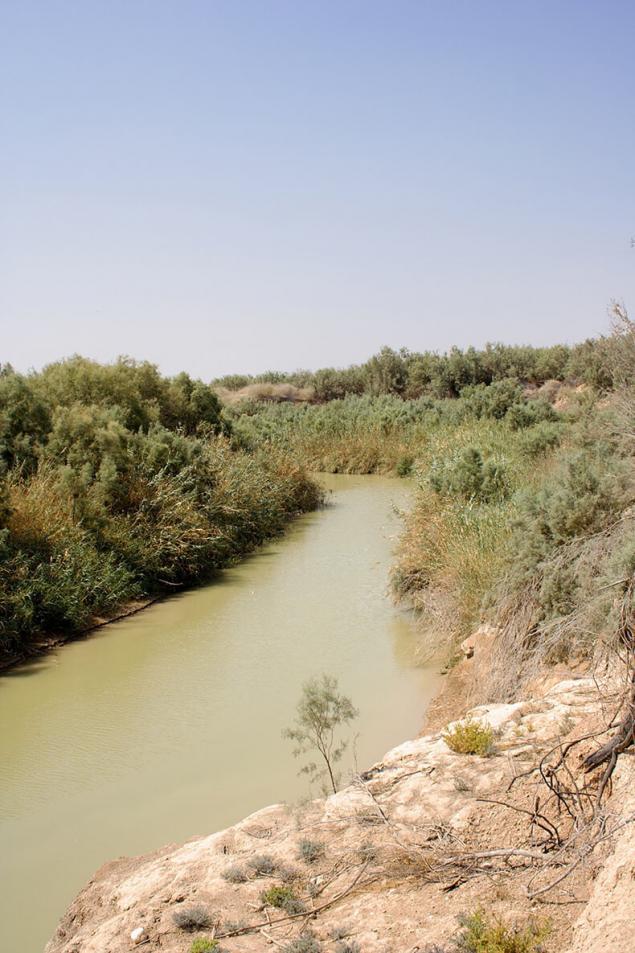
The exact location Wifewere might Beit Avar is not defined. Since XVI century it is the place where is the Greek monastery of St. John the Baptist, a mile from the modern Beit-the Avars, about 10 km East of Jericho and about 5 kilometers from the confluence of the Jordan river to the Dead sea. In the time of king David there was arranged the ferry, and in the 19th century this place was called “the Pilgrim's Ford”, due to the multitude of pilgrims stakanchike here to bathe in the waters of the Jordan.
This way, in 12 centuries before the birth of the Saviour, entered ancient Israel, led by Joshua, in the promised Land. Here, a thousand years before the incarnation of God, crossed over the Jordan, king David, fleeing from the rebels on his own son Absalom. In the same place crossed the river, Elijah and Elisha, and in the Christian era, the same way he went into the desert beyond Jordan to mourn the sins of the venerable Mary of Egypt.
Orthodox Christmas
Christmas in the Orthodox Church are the twelve festive days between Christmas (January 7) and Epiphany (January 19). In Catholic Christianity the Yuletide correspond to the twelve days of Christmas, which lasts from noon on December 25 until the morning of January 6. Often also referred to as Christmastide, the Holy evening in remembrance of the events of the Nativity and the baptism of the Saviour, occurred at night or in the evening.
Hallow twelve days after the celebration of the Nativity of Christ Church began in ancient times. Stating it was 13 conversations of St. Ephraim the Syrian, vypolnennyh from 25 December to 6 January, and the "word" of St. Ambrose and St. Gregory of Nyssa.
Ancient twelve days of the Yuletide celebration is confirmed by the spiritual Charter of the monk Sava the Sanctified.
The same is confirmed and the code of Justinian issued in 535 g Second Turonian Cathedral, 567, round the days from Christmas to Epiphany called festive. Meanwhile, the sanctity of these days and evenings in many places was broken by divination and other superstitious practices that survived from pagan celebrations of the same time.
Works Orthodox law which bans "Christmas eve and in continuation of the Christmas holidays to start, by the old idolatrous traditions, merrymaking and dressing up in komorskie apparel, produce on the streets dancing and singing seductive songs."published
Source: www.pravoslavie.us/RU/Epiphany.htm
- in the Bethlehem Nativity scene was born in the flesh of the Son of God;
- at the baptism of the Son of God, open the heavens "the Holy Spirit descended on Him in bodily form like a dove" (LK. 3, 22);
- and a Voice was heard from Heaven proclaiming: "This is My beloved Son, in whom I am well pleased."

Worship Feast of the Baptism of the Lord is sent in the same way as the feast of the Nativity. Committed on the eve the Royal Hours, Liturgy of St. Basil the Great and Vespers, Great Compline beginning.

The peculiarity of this Festival are two great water blessing (lesser blessing of water can be accomplished at any other time). The first great blessing of water is on the eve of the Feast in the temple. The second in the Celebration under the open sky on the rivers, ponds, wells.
On the day of Baptism the rite of consecration of water is performed in the hole, made in the form of an Orthodox cross. First, in ancient times, were made for the baptism of catechumens and is, subsequently, was drawn to the remembrance of the baptism of the Lord. The second probably originated from the ancient usages of the Jerusalem Christians, the day of Epiphany, to go to the Jordan river to remember the baptism of the Savior. So the Epiphany procession is the name of the procession to the Jordan.
The biblical events of Jesus Christ, had returned after the death of king Herod from Egypt, grew up in the small town of Nazareth, located in Galilee. Blessed with His Mother He remained in this city until His thirtieth year, earning a livelihood Himself and the blessed virgin carpenter's trade.

When executed the thirtieth year of His earthly life, i.e. the time by which according to the Jewish law nobody was allowed to teach in the synagogues, and take a curacy, the time has come for the appearing of His people Israel.
But before that moment, the prophetic word had to appear to Israel in fulfillment of prophecy, on which lay the task of preparing the people of Israel to accept the Messiah, he of whom the prophet Isaiah foretold: “a voice crying in the wilderness, prepare ye the way of the Lord, make straight in the desert a highway for our God”.
Away from people, in the depths of the harsh Judean desert was the word of God came unto John the son of Zechariah, the kinsman of the blessed virgin, which is still in the womb of his mother, the righteous Elizabeth, leaped joyfully welcoming their Saviour, which in the world yet no one knew, except His blessed Mother who received the gospel from the Archangel. The word of God commands John to go out into the world to preach repentance and to baptize Israel, to bear witness of the Light, that all might believe through him.

The Jews coming to John, there is a natural question: is Not this, chamy all the deliverer, the Consolation of Israel? The Baptist, in response said: "come after me one more powerful than I, Whose I am not worthy to stoop down and unloose His shoes; I baptized you with water but He will baptize you with the Holy Spirit".
According to the gospel story, John the Baptist was at the Jordan river in Bethany on the other side (Jn.1:28), came Jesus Christ with the goal to be baptized. John, a lot of preaching about the imminent coming of the Messiah, saw Jesus, he was surprised and said, "I have need to be baptized of Thee, and why COMEST Thou unto me?". To this Jesus replied, "it becometh us to fulfill all righteousness" and was baptized by John.
Jesus Christ had no need of this baptism as a sinless and blameless, one born of the blessed virgin Mary and He, His deity, the former is the source of all purity and Holiness. But as He took upon Himself the sins of the whole world, and came to the waters of the Jordan to purge them through baptism.
He came to be baptized in order to consecrate an aqueous nature, that we grant the font of Holy baptism. He came to be baptized also in order to John saw the fulfillment of the word of God, who commanded him to come out of the desert: “he On Whom you see the spirit descending and abiding on Him, he is The one that'll baptize with the Holy Spirit.”

Holy the Baptist obeyed the word of Christ, and Jordan has taken in its waters, the command Which started the current. As narrates the gospel, after baptism the Lord immediately came out of the water. This "immediately" Church tradition tells us that Saint John the Baptist he baptized each person immersed to the neck, and so held him until, until he confessed all his sins. Only after this man was allowed to get out of the water. Christ, had no sin, could not hold water, and therefore immediately out of the river.
At baptism "the heaven was opened, and the Holy Spirit descended on Him in bodily form like a dove, and a voice came from heaven, saying, Thou art My Beloved Son; in Thee I am well pleased." (LK.3:21-22).
After his baptism Jesus Christ, guided by the Spirit, went into the desert, in solitude, prayer and fasting to prepare for the execution of the mission with which he came to Earth. Jesus Christ forty days "was tempted of the devil and ate nothing in those days, and after them he was hungry" (LK.4:2). Then came to him the devil's three temptations tried to seduce him to sin as any man.
The location of Holy Baptism
The place where he preached, and was baptized by John the Baptist, according to Church tradition, was called a True (countryside beyond the Jordan, where there was a crossing through the river, which explains the name of the town — house of the crossing.

The exact location Wifewere might Beit Avar is not defined. Since XVI century it is the place where is the Greek monastery of St. John the Baptist, a mile from the modern Beit-the Avars, about 10 km East of Jericho and about 5 kilometers from the confluence of the Jordan river to the Dead sea. In the time of king David there was arranged the ferry, and in the 19th century this place was called “the Pilgrim's Ford”, due to the multitude of pilgrims stakanchike here to bathe in the waters of the Jordan.
This way, in 12 centuries before the birth of the Saviour, entered ancient Israel, led by Joshua, in the promised Land. Here, a thousand years before the incarnation of God, crossed over the Jordan, king David, fleeing from the rebels on his own son Absalom. In the same place crossed the river, Elijah and Elisha, and in the Christian era, the same way he went into the desert beyond Jordan to mourn the sins of the venerable Mary of Egypt.
Orthodox Christmas
Christmas in the Orthodox Church are the twelve festive days between Christmas (January 7) and Epiphany (January 19). In Catholic Christianity the Yuletide correspond to the twelve days of Christmas, which lasts from noon on December 25 until the morning of January 6. Often also referred to as Christmastide, the Holy evening in remembrance of the events of the Nativity and the baptism of the Saviour, occurred at night or in the evening.
Hallow twelve days after the celebration of the Nativity of Christ Church began in ancient times. Stating it was 13 conversations of St. Ephraim the Syrian, vypolnennyh from 25 December to 6 January, and the "word" of St. Ambrose and St. Gregory of Nyssa.
Ancient twelve days of the Yuletide celebration is confirmed by the spiritual Charter of the monk Sava the Sanctified.
The same is confirmed and the code of Justinian issued in 535 g Second Turonian Cathedral, 567, round the days from Christmas to Epiphany called festive. Meanwhile, the sanctity of these days and evenings in many places was broken by divination and other superstitious practices that survived from pagan celebrations of the same time.
Works Orthodox law which bans "Christmas eve and in continuation of the Christmas holidays to start, by the old idolatrous traditions, merrymaking and dressing up in komorskie apparel, produce on the streets dancing and singing seductive songs."published
Source: www.pravoslavie.us/RU/Epiphany.htm

